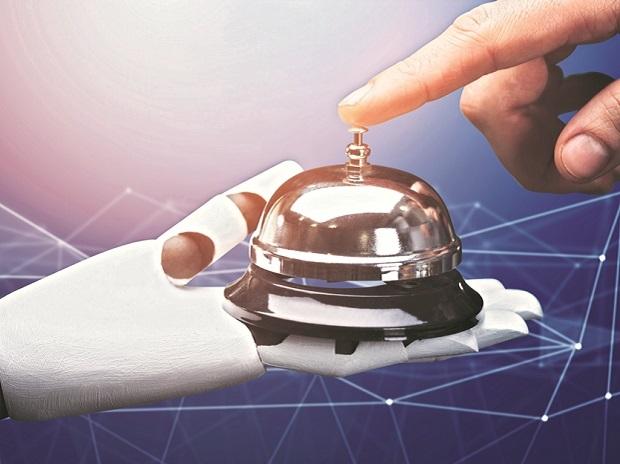Covid 19 Fallout: Faced With Existential Crisis, Hotels Re-imagine Business

Don’t be surprised if you walk into a five-star hotel and see the darvaan (gatekeeper) and floor manager clad in PPE (personal protective equipment) and hazmat suits welcoming you. Instead of a front desk, a chatbot tends to your needs and gadgets provide the silver service.
Faced with an existential crisis, these are some of the changes that marquee brands of the hotel industry — like Hilton, Marriott, and Radisson — are contemplating as they prepare to open doors once the nationwide lockdown, imposed to check the spread of coronavirus disease (Covid-19), is lifted.
Executive lounges with happy hours, complimentary hors d’oeuvres, and complimentary services have been the norm — but not anymore. The reception might soon be history with hygiene becoming key.
The industry might be moving towards pre-plates from a la carte, and buffets will take a backseat. Simple luxuries like a dip in the pool, treatment at spas and salons might slip into oblivion. This was the unanimous opinion of top executives.
ALSO READ: Reasonable capacity utilisation may take a quarter: ITC's Sanjiv Puri
“We have been working in overdrive to ensure that we stay relevant and true to our service commitment in the post Covid-19 world. It is quite apparent that our world will change. In many ways the industry will change,” says Zubin Saxena, managing director (MD) and vice-president, operations, South Asia at Radisson Hotel Group.
“Expect major changes on both products and services sides. We are looking at business normalisation from October, but with a difference. A traveller’s phone will be the key for everything — from bookings to check-ins and check-outs and concierge,” says Sanjay Sethi, MD and chief executive at Chalet Hotels — the asset owner of Marriott, Renaissance, Four Seasons, and Sheraton, among others. All of this will come into play immediately, about three to six months after hotels reopen, says Sethi.
Manish Tolani, vice-president and commercial director at Hilton Hotels & Resorts, adds: “While guests will still end up being treated like a king or queen, we change the process of how we make them feel like one.” The high contact, high touch point industry has to transform into one with minimum touch point but maximum care, he adds.

ALSO READ: Lift coronavirus lockdown by mid-May, Mamata Banerjee tells Centre
Radisson plans to rewire its business to see how it can use technology to replace physical contact in high-touch areas. Hilton is imparting extensive technical and behavioural training to its staff. It is remapping all the high touchpoint areas — from the ceiling to the floor. “Today, it’s all about reassurance and our app is playing an important role in keeping members fully informed about how we are preparing.”
Concerns over hygiene will take centre-stage and all hotels will have washing stations outside toilets in public areas, say analysts. Compliance monitoring and auditing will also be the new buzzwords while dealing with staff hygiene, vaccination and periodic testing.
Taking a step in this direction, Marriott International has established the Marriott Global Cleanliness Council to advance the company’s and properties’ health and safety standards. “Addressing safety and health-related concerns is our topmost priority. We will continue to adopt stringent practices to implement the best hygiene practices,” says Saxena.
Hotels are also bracing for a dip in revenues from MICE (meetings, incentives, conferencing and exhibitions) and F&B (food and beverage) as the scale and format of events become smaller and dining out becomes restricted. The segments have traditionally been cash-cows for most hotels. One also might not see new hotels with multiple restaurants, says Sethi. “I’m not a soothsayer, but believe the industry will get to some semblance of normalcy only after July.”
Stablecoin The Future Of Currency?
The payments system is undergoing a quiet but consequential shift. What was once the exclusive preserve of central banks... Read more
BoE Loosens Capital Rules
The Bank of England has taken a significant step towards easing post-crisis regulation by lowering its estimate of the c... Read more
Monzo Looks For US Banking License
Monzo is preparing a renewed push to secure a US banking licence, four years after abandoning its first attempt when tal... Read more
Crypto Firms Push Into US Banking
America’s cryptocurrency companies are scrambling to secure a foothold in the country’s traditional banking system, ... Read more
Parallel Banking: Stablecoins Are Now Global
Parallel Banking: How Stablecoins Are Building a New Global Payments SystemStablecoins—digital currencies pegged to tr... Read more
JPMorgan Deploys AI Chatbot To Revolutionize Research And Productivity
JPMorgan has deployed an AI-based research analyst chatbot to enhance productivity among its workforce, with approximate... Read more

